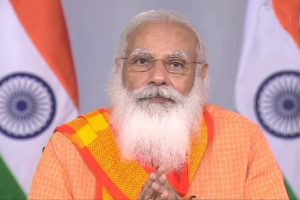
New Delhi: Prime Minister Narendra Modi on Saturday announced that India would start vaccinating children between the ages of 15 to 18 from January 3 next year. Healthcare and frontline workers will be provided with “precautionary doses” from January 10, he added. People above 60 years of age, who have comorbidities, will also have the option to take the booster dose on a recommendation from doctors. This will also start from January 10.
The Prime Minister said that as people prepare to welcome the New Year with hope and celebration, it’s also a time to be careful as the highly contagious Omicron variant is rapidly pushing up Covid infections.
He appealed to the people not to panic but be careful and alert. “Use masks and wash hands regularly,” he said, adding that India will soon have a nasal vaccine and world’s 1st DNA vaccine.
Mr Modi assured the citizens that all possible preparations are in order to tackle increasing infections. He listed the number of hospital beds, oxygen beds available, and vaccination progress.
“Covid isn’t past us yet. Being careful is very important,” he said.
“Today, the nation has 18 lakh isolation beds, 5 lakh oxygen-supported beds, 1.4 lakh ICU beds, and 90,000 special beds for children. Today, we have over 3,000 functional PSA Oxygen plants and 4 lakh Oxygen cylinders have been provided to all states,” he said
Apart from research on the vaccine, we were also working on approval processes, supply chains, distribution, training, IT support system, and certification. With these efforts, India started vaccinating its citizens on January 16 this year,” he said.
“Today, more than 61 percent of India’s adult population has received both doses of the vaccine. Similarly, about 90 percent of the adult population has been given a single dose of the vaccine,” he said.
Meanwhile, Covaxin manufacturer Bharat Biotech has received approval from DCGI for emergency use of its vaccine for children. Bharat Biotech recently submitted the phase 3 clinical trial applications to the Drugs Controller General of India (DCGI) to get approval for the booster dose of its intranasal Covid vaccine named “BBV154”. “We have submitted phase 3 clinical trial applications to DCGI. An intranasal vaccine as a booster dose will be easier to administer in mass vaccination campaigns. Intranasal vaccines have the potential to prevent transmission,” said Bharat Biotech in its application.
Multi-disciplinary central teams have been deployed in 10 states which
are reporting either an increasing number of Omicron and Covid-19 cases or a slow vaccination pace, according to a Union health ministry office memorandum. Meanwhile, a total of 415 cases of Omicron variant of coronavirus have been detected in India so far, out of which 115 have recovered or migrated.
Maharashtra has recorded a maximum of 110 Omicron cases, followed by Delhi at 79, Gujarat 43, Telangana 41, Kerala 38, Tamil Nadu 34 and Karnataka 31. Rajasthan reported 21 new Omicron cases taking tally to 43.
As per the document, these 10 states where teams have been deployed are Kerala, Maharashtra, Tamil Nadu, West Bengal, Mizoram, Karnataka, Bihar, Uttar Pradesh, Jharkhand, and Punjab.
“In view of the rapid surge in cases and deaths because of Covid-19, as reported by various news channels, the state governments, and noted in internal reviews, it has been seen that the number of Omicron cases has emerged in some states.
“It has also been observed that the pace of Covid-19 vaccination in these states is less than the national average. In wake of this situation, a decision has been taken to deploy multi-disciplinary central teams to 10 identified states some of which are either reporting increasing number of Omicron and Covid-19 cases or slow vaccination pace (list enclosed), to aid the efforts of the state and district administration for management of Covid-19,” the memorandum stated.
These teams will be stationed in the states for three to five days, and they will work along with the state health authorities, it said.
The teams will specifically look into areas of contact-tracing, including surveillance and containment operations, and Covid-19 testing, including sending of adequate samples from clusters to the INSACOG network for genome sequencing, the memo stated.
They will also look into enforcement of Covid-appropriate behaviour, availability of hospital beds, sufficient logistics, including ambulances, ventilators, and medical oxygen, and the Covid-19 vaccination progress.
The state-level central teams will assess the situation, suggest remedial actions and submit a report every evening by 7 pm on public health activities being undertaken, besides submitting the same to the state governments, the memo stated.
Further nearly 50 per cent or 87 out of 183 persons detected with the highly transmissible Omicron variant of Coronavirus were fully vaccinated, an analysis of data available with the government reveals.
The findings, government health authorities said, only went to emphasise that “vaccine alone is not sufficient to contain this pandemic” and that use of masks and surveillance is key to breaking the chain of transmission.
Fresh lockdown will be imposed in Maharashtra only if demand for medical oxygen touches 800 metric tons per day, said health minister Rajesh Tope, while Telangana prohibits rallies and public meetings till January 2. Other events, including congregations and New Year parties, will be permitted with Covid-19 appropriate behaviour.
Assam to impose night curfew from 11.30pm to 6am starting December 26.
